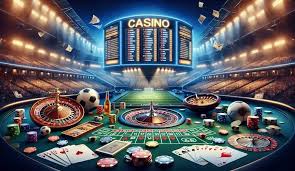
The Psychology Behind Casinos
The allure of casinos goes beyond mere chance; it intertwines with complex psychological principles that influence human behavior. Understanding The Psychology Behind Casinos casino psychology can unveil the ways in which these establishments attract and retain players, often leading them to make choices that may not align with their best interests.
At the heart of casino psychology lies the concept of reinforcement. Casinos are designed to reward players in frequent, albeit small, intervals. This setup aligns closely with the principles of operant conditioning, where actions are reinforced by pleasurable outcomes. Slot machines, for instance, are engineered to deliver a series of wins that keep players engaged, creating an addictive cycle. Even when players don’t win big, the anticipation and excitement sparked by smaller wins reinforce their behavior, making them more likely to continue playing.
The physical environment of a casino is meticulously designed to keep players in a state of excitement and engagement. From the bright lights to the carefully crafted sounds of winning machines, every aspect is intentional. The absence of clocks and windows further amplifies this effect, disorienting players and making it difficult for them to gauge the passage of time. This sensory overload can lead to a state often referred to as “the zone,” where players lose track of their losses and gains, becoming wholly immersed in the moment.
Furthermore, the psychology of loss aversion plays a significant role in how players interact with games. The theory suggests that people experience losses more intensely than gains of the same size. Casinos exploit this by allowing players to chase their losses, believing they can win back what they’ve lost. This creates a dangerous cycle, as players become more willing to invest larger amounts in hopes of recovering previous losses, often leading them to gamble beyond their predetermined limits.

Social proof is another psychological tactic employed by casinos. Seeing others win can create a ripple effect, encouraging nearby players to continue gambling in hopes of experiencing similar luck. Casinos often highlight recent winners through flashy displays and announcements, reinforcing the belief that winning is not only possible but also happening frequently. This visibility of others’ wins fuels a competitive spirit and fosters a community atmosphere that many find appealing.
The concept of “near misses” is also critical in casino psychology. When players almost win—such as landing two out of three symbols on a slot machine—they often feel a surge of excitement as though they were close to victory. This physiological response can be powerful enough to encourage continued play, prompting players to view near misses as a reason to keep trying. Rather than feeling discouraged, players interpret these experiences as signs that they are “due” for a win, further entrenching them in the gambling experience.
Additionally, the concept of personalized experiences has become increasingly prevalent within casinos. By using data analytics, casinos can tailor offers, rewards, and even the gaming experience to individual players. This high level of personalization makes players feel valued and understood, fostering loyalty. Players who receive targeted promotions or complimentary offers are more likely to return, perpetuating a cycle where they feel compelled to engage further.
Online casinos have advanced these psychological techniques even further. By employing algorithms that analyze player behavior, these platforms can optimize everything from game recommendations to promotional offers. The convenience of accessing casinos from home, coupled with the targeted engagement strategies similar to traditional casinos, amplifies the psychological influences at play. The digital space allows for even less oversight, often leading to increased gambling tendencies as players can access their favorite games at any moment.

Furthermore, the psychology of uncertainty fuels the excitement of gambling. When players are unaware of the odds or outcomes, it heightens the thrill of the unknown. Casinos thrive on this uncertainty, providing an unpredictable environment that keeps players engaged. The possibility of experiencing life-changing wins—essentially a jackpot—creates a narrative that is hard to resist. Players are drawn to the risk, fluctuating between hope and despair, which enhances their overall gambling experience.
Understanding these psychological components is essential not only for players to recognize the influences at play but also for regulators who aim to promote responsible gaming practices. As the gambling landscape evolves, continued psychological research will be pivotal in shaping policies designed to protect vulnerable individuals from potentially harmful habits.
Moreover, it is vital for players to develop awareness of their gambling habits and understand the psychological traps that casinos set. Setting limits, understanding personal motivations for gambling, and seeking help when necessary can empower players to enjoy gaming without falling victim to its darker sides.
In conclusion, the psychology behind casinos encompasses a complex interplay of behavioral science, environmental design, and emotional engagement. By understanding these factors, players can better navigate the immersive world of gambling and make informed decisions about their participation. The psychological allure of casinos is undeniable, but with awareness and self-regulation, players can enjoy the thrill of gaming while minimizing risks associated with excessive gambling.
